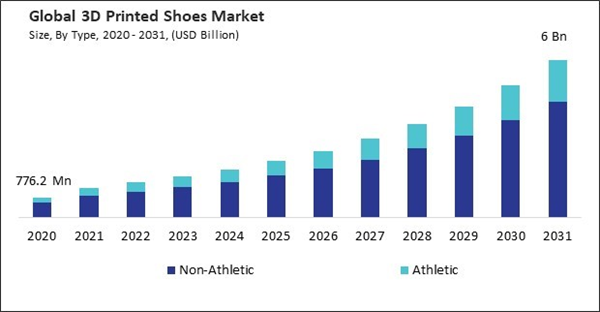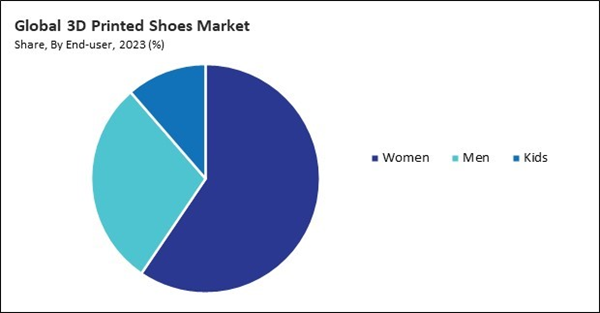North America is at the forefront of technological innovation, with a robust ecosystem of research institutions, technology companies, and startups driving advancements in 3D printing technology. Thus, the North America region acquired 38.5% revenue share in the market 2023. In terms of volume, the North America region would attain a volume of31.15 million units by 2031. With the ongoing development and increased availability of 3D printing technology, there is a growing trend among consumers in North America to adopt this as an inventive and unique footwear alternative.
3D printing enables rapid prototyping, allowing shoe designers and manufacturers to quickly create physical prototypes of new designs. Traditional prototyping methods often require time-consuming processes such as molding and tooling, which can delay product development timelines.
Additionally, more footwear manufacturers, including established brands and startups, can adopt 3D printing technology for shoe production. This increased accessibility accelerates the adoption of 3D printed shoes and drives market growth. Therefore, expanding 3D printing industry globally propels the market's growth.
However, the initial cost of acquiring 3D printing equipment, including printers, scanners, and software, can be substantial. High-quality industrial-grade 3D printers producing footwear with the necessary precision and speed can be expensive. Thus, limited material options are hampering the growth of the market.
End Use Outlook
On the basis of end-user, the market is segmented into men, women, and kids. The women segment recorded 59.5% revenue share in the market in 2023. In the terms of volume, the women segment would attain a volume of40.70 million units by 2030. Women are often more fashion-conscious and trend-focused, increasing demand for innovative and stylish footwear.Type Outlook
Based on type, the market is divided into athletic and non-athletic. The athletic segment attained 25.3% revenue share in the market in 2023. In terms of volume the athletic segment would attain a volume of20.25 million units by 2031.Personalized and unique products are experiencing an increasing prevalence in diverse consumer segments, including the athletic footwear industry.Regional Outlook
Region-wise, the market is analyzed across North America, Europe, Asia Pacific, and LAMEA. The Asia Pacific region generated 26.9% revenue share in the market in 2023. IN the terms of volume, the Asia Pacific region would attain a volume of21.39 million units by 2030. The Asia-Pacific region, specifically urban centers, is experiencing a rapid increase in population.List of Key Companies Profiled
- Nike, Inc.
- Adidas AG
- PUMA SE (Groupe Artémis S.A.)
- SKECHERS USA, Inc.
- New Balance Athletics, Inc.
- Under Armour, Inc.
- Reebok International Ltd. (Authentic Brands Group LLC)
- Stratasys, Ltd.
- FitMyFoot Inc.
- Aetrex, Inc.
Market Report Segmentation
By Type (Volume, Thousand Units, USD billion,2020-2031)
- Non-Athletic
- Athletic
By End-user (Volume, Thousand Units, USD billion,2020-2031)
- Women
- Men
- Kids
By Geography (Volume, Thousand Units, USD billion,2020-2031)
- North America
- US
- Canada
- Mexico
- Rest of North America
- Europe
- Germany
- UK
- France
- Russia
- Spain
- Italy
- Rest of Europe
- Asia Pacific
- China
- Japan
- India
- South Korea
- Singapore
- Malaysia
- Rest of Asia Pacific
- LAMEA
- Brazil
- Argentina
- UAE
- Saudi Arabia
- South Africa
- Nigeria
- Rest of LAMEA
Table of Contents
Companies Mentioned
- Nike, Inc.
- Adidas AG
- PUMA SE (Groupe Artémis S.A.)
- SKECHERS USA, Inc.
- New Balance Athletics, Inc.
- Under Armour, Inc.
- Reebok International Ltd. (Authentic Brands Group LLC)
- Stratasys, Ltd.
- FitMyFoot Inc.
- Aetrex, Inc.










